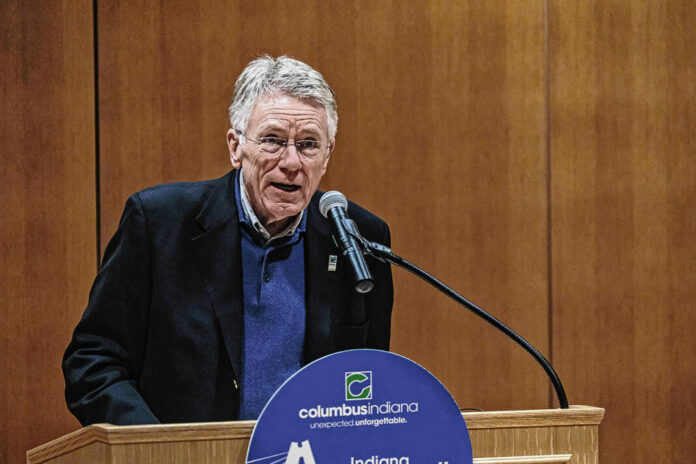
Mike Wolanin | The Republic Columbus Mayor Jim Lienhoop addresses guests at the Rally in Support of the Asian American Community event at Columbus City Hall in Columbus, Ind., Thursday, Jan. 26, 2023.
Columbus Mayor Jim Lienhoop, along with the leaders of nearby communities, are preparing to announce the launch of a regional alliance to address climate change.
The announcement, which will take place Friday at Nashville Town Hall, is expected to include remarks from Lienhoop, Bloomington Mayor John Hamilton and Nashville Town Manager Sadie Jones.
The three leaders will discuss “the next steps of working together in a bipartisan, cross-sector, multi-county effort to address climate change,” including “committing to launch a southern Indiana regional climate alliance,” the city of Bloomington said.
Currently, it is unclear what kinds of measures the alliance will take, though it could include an update of Columbus’ greenhouse gas emissions inventory, Lienhoop said.
Lienhoop said the group of leaders hopes “to see what kind of a budget we might be able to accumulate and work with folks in this arena to help us understand what is measurable and what can be influenced and try to adopt some goals for what we want to improve.”
“We thought we would give people a little bit of an update on the conversations that we’ve had,” Lienhoop said. “We don’t have any specific initiatives to announce but felt like it was appropriate for us to say something since it had been a while since we last spoke to the public.”
The launch of the regional alliance comes nearly six months since Linehoop and Hamilton hosted a regional climate convening to “address the shared challenge” of climate change and “explore preparation, adaptation and mitigation measures.”
The event included remarks by Lienhoop and Hamilton, panel discussions, break-out work and a keynote address by Cummins Executive Chairman Tom Linebarger.
The launch of the alliance also comes just days after a United Nations panel of scientists said humanity still has a chance, close to the last, to prevent the worst of climate change’s future harms, The Associated Press reported.
But doing so requires quickly slashing nearly two-thirds of carbon pollution by 2035, the Intergovernmental Panel on Climate Change said. The United Nations chief said it more bluntly, calling for an end to new fossil fuel exploration and for rich countries to quit coal, oil and gas by 2040.
“Humanity is on thin ice — and that ice is melting fast,” United Nations Secretary-General Antonio Guterres said. “Our world needs climate action on all fronts — everything, everywhere, all at once.”
Stepping up his pleas for action on fossil fuels, Guterres called for rich countries to accelerate their target for achieving net zero emissions to as early as 2040, and developing nations to aim for 2050 — about a decade earlier than most current targets, according to wire reports. He also called for them to stop using coal by 2030 and 2040, respectively, and ensure carbon-free electricity generation in the developed world by 2035, meaning no gas-fired power plants either.
With the world only a few tenths of a degree away from the globally accepted goal of limiting warming to 1.5 degrees Celsius (2.7 degrees Fahrenheit) since pre-industrial times, scientists stressed a sense of urgency, according to the AP. The goal was adopted as part of the 2015 Paris climate agreement and the world has already warmed 1.1 degrees Celsius (2 degrees Fahrenheit).
This is likely the last warning the Nobel Peace Prize-winning collection of scientists will be able to make about the 1.5 mark because their next set of reports may well come after Earth has either passed the mark or is locked into exceeding it soon, several scientists, including report authors, told The Associated Press.
Locally, Lienhoop said the climate alliance is a starting point and that working along with other community could increase the leverage their efforts have.
“We’ve partnered with Bloomington on a few other initiatives and have been very pleased with the way they’ve worked out,” Lienhoop added. “So our thought was that perhaps by working together, we could get a little bit more leverage than if either one of us tried to approach this by ourselves.”
“I accept (climate change) as real, and I want to be able to say to my kids and grandkids that I did what I could to manage it as best we could,” Lienhoop added.




